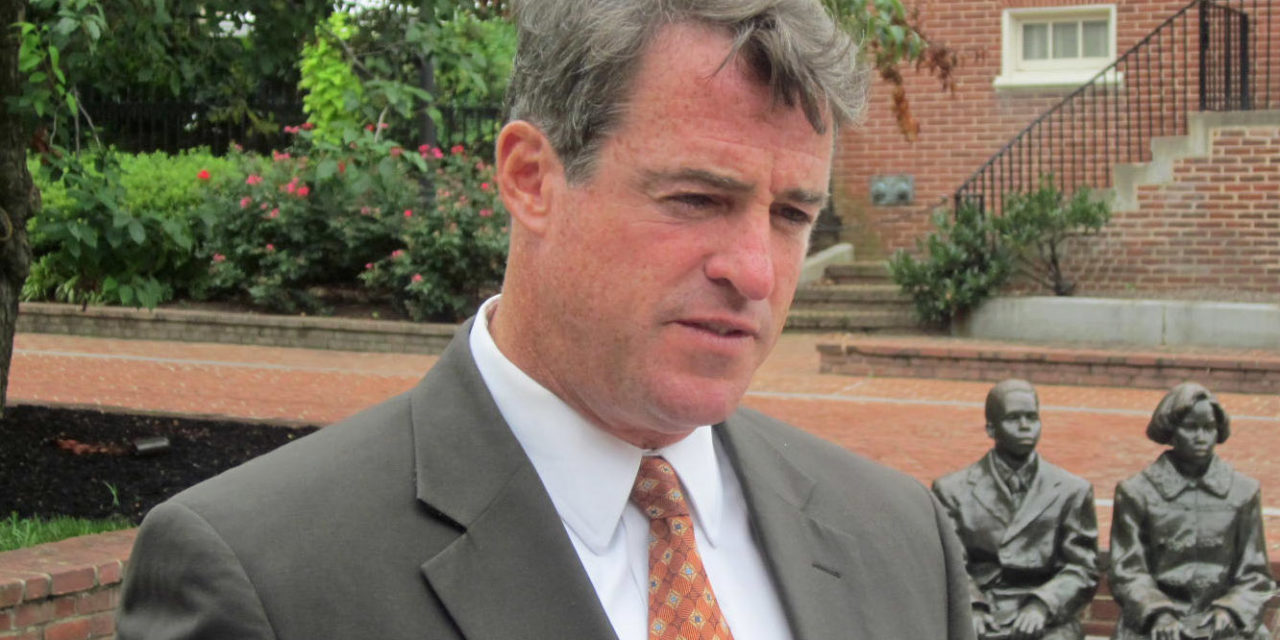Attorney General Doug Gansler said the chilly cellar at the back of Harry Browne’s restaurant across the street from the State House epitomizes the kind of “back room” dealing his six proposals for greater transparency in government would try to eliminate. (The restaurant’s cozy second floor bar is actually the more common venue for deal-making, but no matter.)
The meeting was the third in “Build Our Best Maryland” series that Gansler is holding around the state to discuss policy issues as he prepares to announce his race for governor in the fall. Some members of the legislature have shown an interest in transparency, accountability and openness in government, but few statewide candidates even mention the topic. A summary of the proposals is at the bottom of this blog.
Gansler cited the study by State Integrity Investigation that gave Maryland a D- on a detailed Corruption Risk Report Card.
Public information inspector general, transparency portal
Gansler wants to create a new position of public information inspector general in the comptroller’s office, though he’s not sure whether the position should report to the comptroller or just be located there.
“Comptroller Peter Franchot had nothing to do with that” proposal, Gansler said.
According to Gansler, “This Inspector General will be charged with collecting public information across agencies, conducting agency performance audits, ensuring user-friendly public access to the information and audits via a Transparency Portal, monitoring complaints about access to public information, and making recommendations to remove undue barriers to public information.”
A Comprehensive Open MD Transparency Portal
to “consolidate existing databases across agencies into one user-friendly, easily navigated portal,” allowing citizens to create their own comparisons.
He also wants meetings of outside parties with state agencies developing regulations to be recorded. In follow up questioning, Gansler said he didn’t want the meetings themselves to be open to the public, but simply recorded for the record.
Gansler said he wants to create an Open Book database “that allows the public to explore state contracts awarded to corporations alongside campaign contributions made by that corporation, its officers or employees.” It was only this year that the legislature passed a law requiring campaign donors to list place of employment.
The attorney general also wanted Democracy Innovation Labs to host open source innovation labs and competitions to develop technological tools that enable Marylanders to make the state more accessible, transparent and accountable. He also wants to offer Local Sunshine Challenge Grants to “provide localities and counties infrastructure support to replicate and link local expenditure tracking to state portals.”
Mostly tech and policy wonks attended
The session was attended by about a dozen people, mostly technology wonks such as OpenGov Foundation and good government groups such as Common Cause and Maryland PIRG.
The tech folks reacted favorably to the portal, but both MarylandReporter.com and Common Cause’s Jennifer Bevan-Dangel raised problems with the current implementation of Maryland’s Public Information Act, including the withholding of documents and the fees state agencies charge to assemble information. State agencies responses to Public Information Act requests (the state equivalent of the federal Freedom of Information Act) are often guided by assistant attorneys general who do the legal work for the agencies but technically work for Gansler.
Fiscal conservative and social progressive
Gansler said some of the proposals grew out of his position as a “fiscal conservative and social progressive” to make sure that “we’re spending money efficiently and effectively.”
Gansler mentioned, “We’ve had 40 new taxes” over the last six years, a line that more frequently comes out of the mouth of Republican legislators and GOP candidates for governor. With Franchot no longer looking at a race for governor, Gansler is positioning himself as the fiscal conservative in contrast to Lt. Gov. Anthony Brown, who has fully embraced the record of the O’Malley-Brown administration.
Until this year, Gansler had made no public comment on the tax and fee hikes proposed by Gov. Martin O’Malley and passed by the General Assembly. The attorney general represents them both on legal matters.
“Taxpayers entrust Annapolis with their hard earned money,” Gansler said in a statement. “More needs to be done to ensure that the programs they pay for are delivering for people, not special interests or insiders.”
–Len Lazarick
Gansler’s six Good Government Overhaul Proposals
Below is a brief summary from the campaign of the six points in Gansler’s “Good Government Overhaul for MD” proposals:
1) Public Information Inspector General. At present, Maryland has no statewide agency solely responsible for promoting public access to information. Instead, we allow each administrative agency to set its own transparency standards and disclosure rules.
As a result, Maryland has a spotty transparency record. Additionally, our legislature has the authority via legislative audits to hold executive branch agencies accountable for compliance with accounting practices and StateStat is used to measure agency performance, but both are designed for internal accountability, neither are effective tools for public accountability.
To ensure the transparency necessary for true public accountability we should create an Inspector General within the Comptroller’s Office who will be charged with monitoring and ensuring that the public not only has access to public information, but has access to that information in a format that allows them to assess government performance and demand accountability. To do that, this Inspector General will be charged with collecting public information across agencies, conducting agency performance audits, ensuring user-friendly public access to the information and audits via a Transparency Portal (see below), monitoring complaints about access to public information, and making recommendations to remove undue barriers to public information.
In addition to performance audits, the Inspector General will produce an agency report card identifying areas of improvement and barriers to keeping Maryland transparent and accountable to the public.
2) Comprehensive Open MD Transparency Portal. Maryland collects a wealth of information, but it is not integrated in a meaningful way nor is it provided in a user-friendly manner.
We should consolidate existing databases across agencies into one user-friendly, easily navigated portal that will allow visitors to generate custom reports detailing government expenditures and performance across entities and programs. This will include links to pre-approved and final contracts describing the nature of the service provided, audits performed, subsidies and tax credits* provided, and tax dollars spent.
Additionally, the database will include a performance monitor that includes information on jobs created, revenue generated, and other performance metrics. The public will be able to do a side-by-side comparison of costs, subsidies, etc. versus jobs created, revenue generated, etc., allowing for a more accurate cost benefit analysis of various projects.
Finally, the tool will allow users to track the location of all state contracts/projects sorted by legislative districts receiving incentives alongside geographical data noting unemployment and economic development needs across the state.
3) Open Meeting Records Rule. Create an Open Meetings Records Rule to promote transparency in the development of state regulations.
The Maryland General Assembly relies heavily on state agencies to develop and adopt regulations, yet state agencies are not required to make public meetings held between state employees and outside parties regarding the development of those regulations. As a result, information regarding those who influence this process is currently not accessible or available.
We should adopt an Open Meeting Records Rule modeled after the disclosure requirements of the White House Office of Information Regulatory Affairs that will promote transparency in Maryland’s rule making process; and to comply with the rule, set up a user-friendly website that archives every meeting with outside parties (state or local governments, small business, special interests groups, etc.) when the meeting concerns state regulations under review. The information would include date of the meeting, attendees and a PDF scan of attachments provided by the outside parties.
4) Open Book. Create a database that allows the public to explore state contracts awarded to corporations alongside campaign contributions made by that corporation, its officers or employees.
With this tool, Marylanders could easily discover when government agencies may be awarding contracts based on political connections.
5) Democracy Innovation Labs. Host open source innovation labs and competitions in partnership with technology leaders and hubs including the Greater Baltimore Technology Council, iStrategy, OpenGov Foundation and others to develop technological tools that enable Marylanders to make the state more accessible, transparent and accountable to Marylanders.
6) Local Sunshine Challenge Grants. Provide localities and counties infrastructure support to replicate and link local expenditure tracking to state portals. The bulk of state expenditures are distributed by localities that have incongruent reporting at best. Providing tools to local municipalities will encourage greater transparency and cost-benefit analysis at all levels of government.






This is a bunch of nonsense. Gansler ignores the Maryland PIA laws when it is convenient for his agenda.
I sued him, DHR, and Kevin Kamenetz in the Baltimore County District court for violation of PIA laws. which was “filed and received” by the Circuit Court after a bunch of obfuscation and nonsense. The lawsuit number is 03-0C-13-007509 and has yet to be scheduled.
I spoke with Gansler on the Charles Brooks show on April 13. I asked him about my emails to him concerning PIA requests to him and others that have gone unanswered for more than five months. He said he was unaware of my emails and I should write to him. I did just that on April 15, 2013 and now three months latter there is still no response from Mr. Gansler.
His movement around the State with such nonsense is political gobbledygook. He could care less about the Maryland PIA laws, transparency or accountability. Mr. Gansler if you comments reporter in the Maryland Reporter and the Baltimore Sun are credible, look into the debacle going on at DHR and in Baltimore County under Kevin Kamenetz, Mike Field and Don Mohler.
Democrats…….transparency…….hahahahahahahahahaha!!!!!!!!!!!!!
And the cost for said “wonderful” new programs to insure that we get what we are being taxed ad nauseum to pay for Mr. Gansler? How would the Dems in Annapolis reign without handing out goodies to cronies & special interest groups? More phoney-baloney political pandering.
How can we expect someone as utterly unethical as Gansler to actually propose something he and his fellow corrupt Democrats will not misuse? As it stands, Democrats blithely ignore open meeting inquiries and other similar requests unless taken to court. In a state where the majority party shows its contempt for the law every day, why would anyone believe Gansler or trust his motives? I predict if this comes to pass it will be used/abused as a weapon against Maryland’s remaining Republicans, and the rampant political corruption that got undeserving, incompetent, corrupt slimeballs like Gansler and O’Malley in office will continue unabated and probably get worse.
The proposals look pretty good. And perhaps better than the proposals themselves is the “tone at the top.” Gensler might put forth a candidate for the IG position so voters could assess the person’s professional qualifications for performing job duties of the position. It would be better that the IG report to the governor or lieutenant governor, which would elevate finding resolution to a level above the organizational levels who would be responsible for implementing the IGs recommendations.